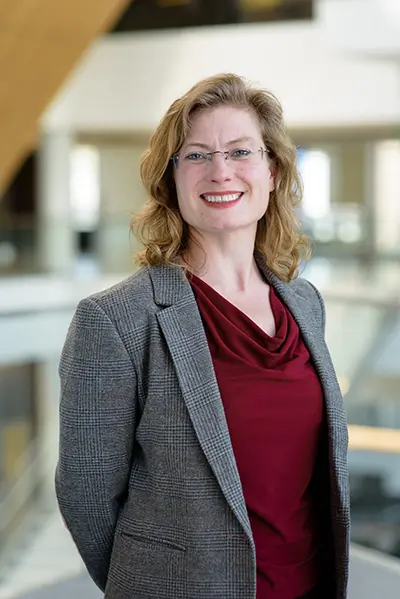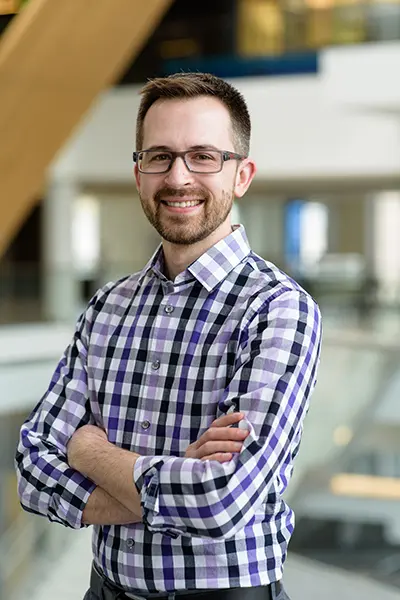'SWIMMER' Program Trains Students to Develop Sustainable Materials and Chemicals

09/22/2021
By Ed Brennen
In a city that owes its existence to a healthy and dependable waterway, an interdisciplinary team of UMass Lowell faculty are pooling their expertise to train young engineers, scientists and policymakers how to protect threatened water resources.
Led by Plastics Engineering Assoc. Prof. Meg Sobkowicz-Kline and Mechanical Engineering Assoc. Prof. Chris Hansen, the team recently received a five-year, $2,998,922 National Science Foundation (NSF) Research Traineeship award to create the Sustainable Water Innovations in Materials – Mentoring, Education and Research (SWIMMER) program at UML.
The program will train 60 master’s and Ph.D. students — from the fields of plastics, mechanical, chemical, and civil and environmental engineering, as well as chemistry, earth science, biology, public health and economics — to develop sustainable materials and chemicals that won’t harm water resources over their entire life cycle.
With toxic “forever chemicals” such as PFAS now found to be contaminating drinking water supplies, and with drought threatening water resources both in the U.S. and globally, Hansen says SWIMMER scholars will be addressing an urgent issue.
“This is a relevant topic that applies to their life,” he says. “They can be a change agent — an agent for good in the world.”
SWIMMER scholars will receive interdisciplinary training from a team that includes: Assoc. Prof. Sheree Pagsuyoin (Civil and Environmental Engineering); Asst. Prof. James Reuther (Chemistry); Prof. Joel Tickner (Public Health); Prof. Juliette Rooney-Varga (Environmental, Earth and Atmospheric Science); Asst. Prof. Frederic Chain (Biological Sciences); Assoc. Prof. David Kingsley (Economics) and Greg Morose, research manager at UML’s Toxics Use Reduction Institute (TURI).

The team will spend the next year developing curriculum and recruiting the first cohort of nearly a dozen scholars, with hopes of starting them in fall of 2022. Participants will pursue their advanced degrees in their chosen fields, while also working across disciplines with other members of their SWIMMER cohort.
The program will feature a preparatory boot camp, a two-semester core course and team capstone projects.
Participants will also complete an internship hosted by partner organizations, such as the Merrimack River Watershed Council or with a company affiliated with the Green Chemistry in Commerce Council, where Tickner is executive director.
“We don’t want all of their education to happen just at UMass Lowell or just with their research faculty. The idea is to have this real-world engagement,” Hansen says.
To ensure the program taps into the talents of students from underrepresented groups, it includes graduate student recruiting partnerships with Prairie View A&M University (located outside Houston) and the University of Puerto Rico Mayaguez — both of which are deemed minority-serving institutions by the U.S. Department of Education.
Hansen and Sobkowicz-Kline say it’s critical to produce graduates with not only the STEM skills required for innovative solutions, but who are also responsive to societal needs for environmental justice and inclusive decision-making.
“It’s just a fact that minority communities in America are disproportionately impacted by pollution and by degradation of resources,” Hansen says. “We’re already starting to see that in some cases with PFAS in the water systems in Massachusetts.”

“Students have to hone their skills in communicating with diverse stakeholders — both colleagues they’re going to work with from very disparate fields, and also with the public about what they do and the benefits they bring,” she says.
At the Tsongas Industrial History Center, SWIMMER scholars will learn how past pollution in the Merrimack River led to health crises in Lowell. The Merrimack now provides drinking water for about 500,000 people in five Massachusetts communities, including Lowell, and to several communities in New Hampshire.
“They will see what it was in the past, what it is in the present, and how to hopefully prevent those things in the future,” Hansen says.
With sustainability serving as the “seed” of the SWIMMER program, Sobkowicz-Kline says it aligns well with the university’s goals — and with the mission of the Rist Institute for Sustainability and Energy.
“I hope it can be a good example, along with the Rist Institute, as to how to integrate a lot of very disparate pieces of what the university does well under one umbrella,” she says.
And for students, Hansen says the SWIMMER program can serve as a springboard to their careers — be it in industry, at a startup, at a nonprofit, in public service or in the classroom as an educator.
“We want them to form lifelong partnerships and collaborations with the other people in their cohort, and we want them to translate that into amazing research that becomes nationally and internationally known,” he says. “And then ultimately, when they graduate, they’re doing something that really no one else has this skillset to do.”
SWIMMER was one of 23 projects to receive a share of $64 million in funding from the NSF Research Traineeship program as part of the American Rescue Plan Act of 2021.
